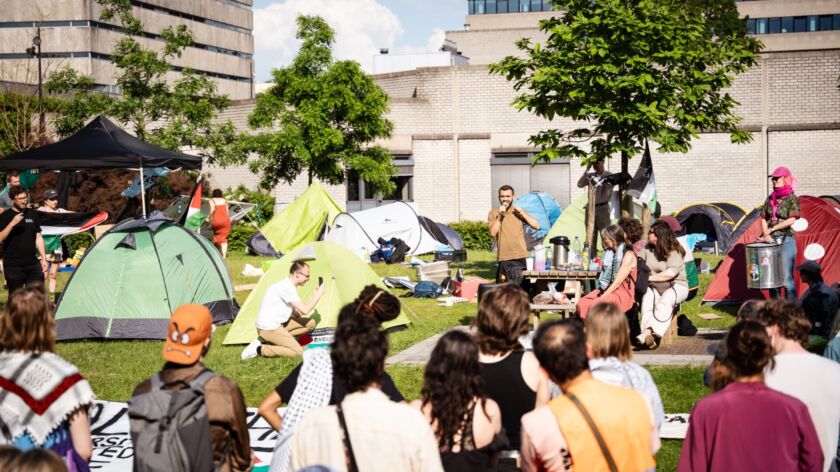Cabinet prohibits visit of controversial Mohammed Khatib to Radboud University
-
 Mohammed Khatib spoke earlier this year at the pro-Palestinian tent camp at the university. Photo: Johannes Fiebig
Mohammed Khatib spoke earlier this year at the pro-Palestinian tent camp at the university. Photo: Johannes Fiebig
Mohammed Khatib will not be speaking at Radboud University on Monday, following a decision by the Dutch cabinet to prevent the European leader of the pro-Palestinian group Samidoun from entering the country.
The decision has been made: after a turbulent week, the cabinet has ruled that Mohammed Khatib is not welcome in the Netherlands. Ministers Marjolein Faber (Asylum and Migration) and David van Weel (Justice and Security) confirmed the decision, halting the planned lecture titled Situating Palestine, where Khatib was set to discuss ‘criminalisation and resistance in the Palestinian diaspora’.
The decision comes after a week of heated debate over Khatib’s planned appearance on the Nijmegen campus. Following the announcement last weekend, public outcry erupted on social media and in various news outlets.
Open Letters
In an open letter, a group of Radboud University faculty and students urged the university’s executive board to cancel the Samidoun leader’s visit, arguing that ‘extremist hate preachers should not be given a platform at the university’. Soon after, another open letter by Israeli students and staff echoed this call.
Samidoun, the organisation Khatib represents, has faced considerable controversy; it is banned in Germany, the U.S., and Canada. Khatib previously voiced support for the Popular Front for the Liberation of Palestine (PFLP), which is classified as a terrorist organisation in the Netherlands.
“There is absolutely no place for incitement to hatred, glorification of violence, or the spread of anti-Semitism in the Netherlands,” Minister Faber stated on X. “That is why we have decided to deny Samidoun speaker Mohammed Khatib entry to our country.”
Not antisemitic
The decision is not without controversy. RTL Nieuws reported that officials from the National Coordinator for Counterterrorism and the Immigration and Naturalisation Service (IND) indicated there might be ‘insufficient legal grounds‘ to ban Khatib from the Netherlands.
Yesterday, two organizers of the lecture series defended Khatib, aiming to dispel fears surrounding the event and emphasising that Khatib is not an anti-Semite. According to the organizers, while his views might be provocative, they are within legal bounds. They argue that the fear surrounding his visit reflects media and political narratives, which they see as clear examples of Islamophobia and anti-Palestinian racism, according to the scholars of Situating Palestine.
Translated by Siri Joustra



